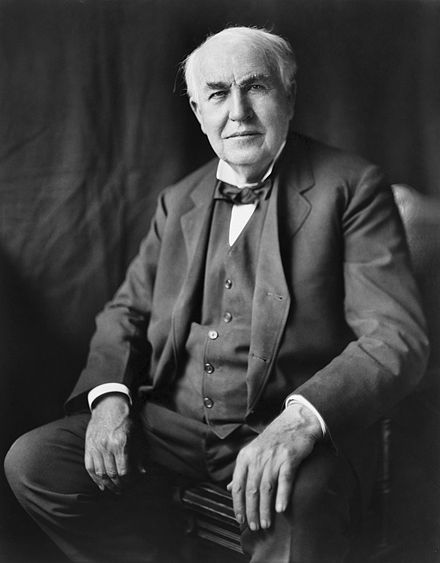
Thomas Alva Edison (February 11, 1847 - October 18, 1931) was an American inventor, scientist, and businessman who developed many devices that greatly influenced life around the world, including the phonograph, the motion picture camera, and a long-lasting, practical electric light bulb. Dubbed "The Wizard of Menlo Park" (now Edison, New Jersey) by a newspaper reporter, he was one of the first inventors to apply the principles of mass production and large teamwork to the process of invention, and therefore is often credited with the creation of the first industrial research laboratory. (wikipedia)
Bloomfield-Moore
"The existence of an intelligent Creator, a personal God, can to my mind, almost be proved from chemistry," writes Edison; and George Parsons Lathrop, in commenting upon Edison's belief, says:- "Surely it is a circumstance calculated to excite reflection, and to cause a good deal of satisfaction, that this keen and penetrating mind, so vigorously representing the practical side of American intelligence - the mind of a remarkable exponent of applied science, and of a brilliant and prolific inventor who has spent his life in dealing with the material part of the world - should so confidently arrive at belief in God through a study of those media that often obscure the perception of spiritual things." Edison, it seems, like Keely, has never been discouraged by the obstacles which he meets with, in his researches, nor even inclined to be hopeless of ultimate success.
"Unlike Keely, Edison through all his years of experimental research has never once made a discovery. All the work of this great and successful inventor has been deductive, and the results achieved by him have been simply those of pure invention. Like Keely he constructs a theory, and works on its lines until he finds it untenable; then, he at once discards it and forms another theory. In connection with the electric light, he evolved or constructed three thousand successive theories; each one reasonable and apparently likely to be true; yet, only in two cases was he able to prove by experiment that his theories were correct. Of such a nature is the "dead-work" which all researches on scientific principles must toil through to attain success." [Bloomfield-Moore, More Science]
This professor's (Hertz) researches into the structure of ether are rapidly leading him into the discoveries which constitute what is known as "Keely's secret," and which, when made known, will explain much that is now classed with the inexplicable. Mr. Edison will then better understand the force which he finds so mysteriously associated with electricity: for electricity is but one current of a triune stream, and the dominant current (which has never been controlled by man and never can be, any more than the lightning that flashes in the clouds) carries with it a sympathetically attendant force mysteriously associated, which gives that power of propulsion that induces disturbance of negative equilibrium. [Keelys Discoveries]
Nikola Tesla Talks About Thomas Edison
“One of the great events in my life was my first meeting with Edison. This wonderful man, who had received no scientific training, yet had accomplished so much, filled me with amazement. I felt that the time I had spent studying languages, literature and art was wasted; though later, of course, I learned this was not so.” [Nikola Tesla (“Making Your Imagination Work For You.” American Magazine, April, 1921.)]
“If Edison had a needle to find in a haystack, he would proceed at once with the diligence of the bee to examine straw after straw until he found the object of his search. I was a sorry witness of such doings, knowing that a little theory and calculation would have saved him ninety percent of his labor.” [Nikola Tesla (New York Times, October 19, 1931.)]
See Also
